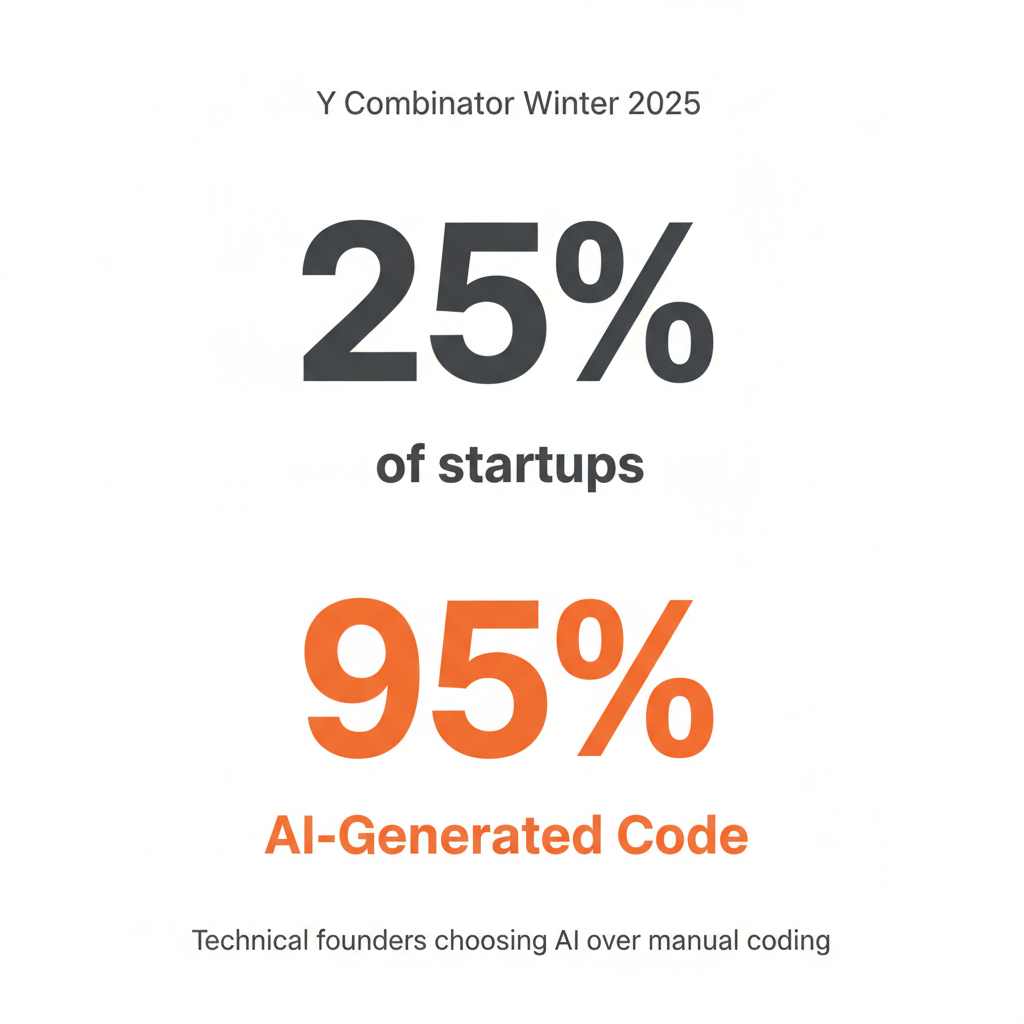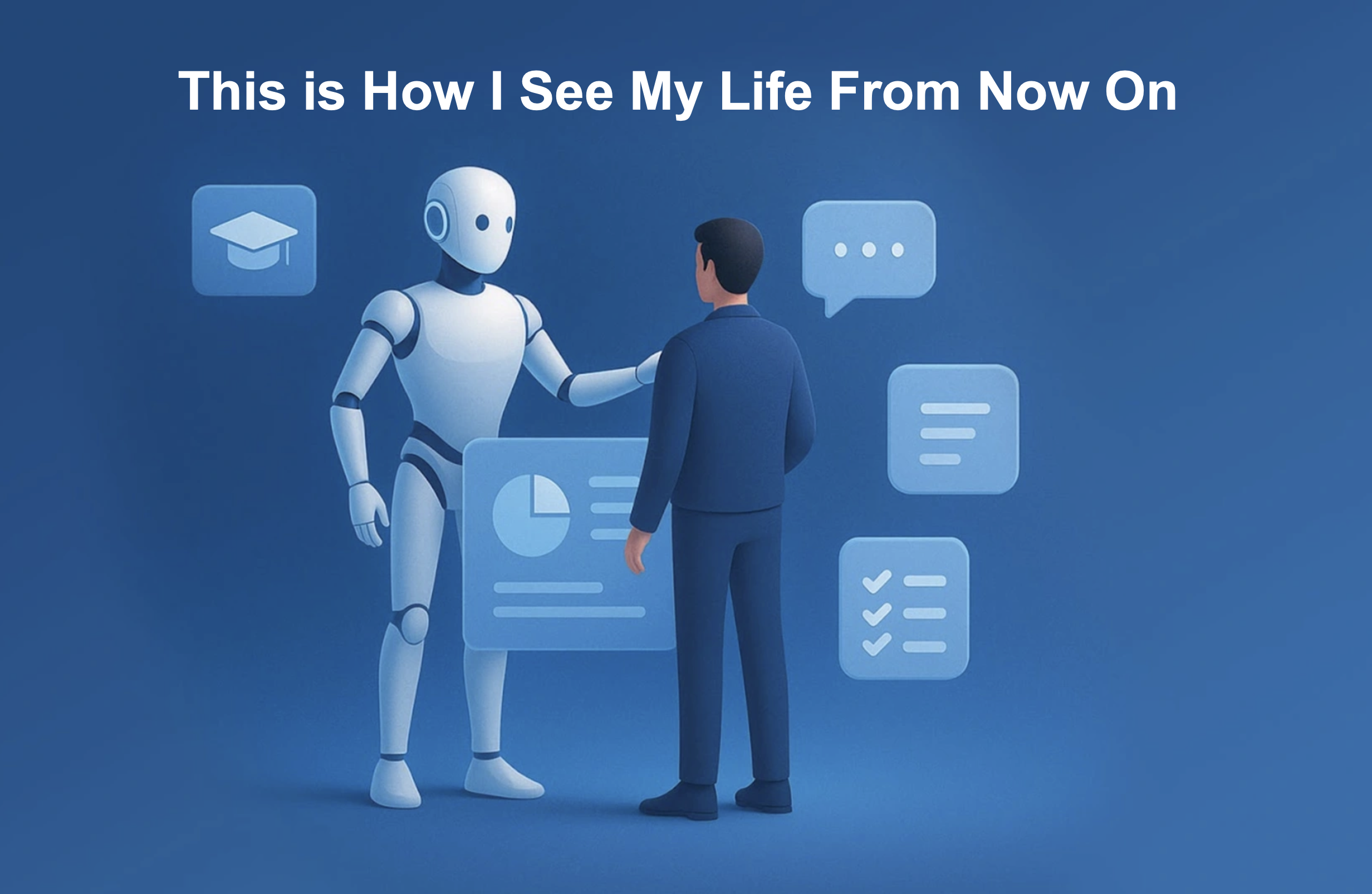A Moment That Changed Everything
Lesson Video:
In March 2025, Y Combinator managing partner Jared Friedman revealed something remarkable: a quarter of startups in their Winter 2025 batch had codebases that were approximately 95% AI-generated (excluding library imports). As Friedman emphasized, "It's not like we funded a bunch of non-technical founders"—these were technical founders "completely capable of building their own products from scratch" who chose to let AI handle most of the implementation.
Think about what that means. Technical founders capable of coding everything themselves found it more effective to specify what they wanted and let AI generate the implementation. They focused on architecture decisions, product strategy, and user experience while AI handled the mechanical work of translating requirements into code. However, as YC CEO Garry Tan noted, these founders still needed deep technical skills: "You have to have the taste and enough training to know that an LLM is spitting bad stuff or good stuff."

This pattern is appearing everywhere in software development. Junior developers are building features that previously required senior architects. Mid-level engineers are prototyping in hours what used to take weeks. Senior developers are orchestrating autonomous agents to handle implementation details while they focus on system design and business logic.
🎓 Expert Insight
Notice the collaboration pattern at YC startups: Founders provide specifications (what the system should do) and architectural decisions (how components interact). AI handles implementation (writing code, tests, documentation). This is the Three-Role AI Partnership in action—AI as teacher (suggesting patterns), student (learning project context), and co-worker (implementing alongside humans).
This Isn't Incremental Improvement—It's Transformation
 Here's what makes this moment different from previous shifts in software development:
Here's what makes this moment different from previous shifts in software development:
Previous transitions (assembly to C, procedural to object-oriented, desktop to cloud, monolithic to microservices) took 10-15 years to become standard practice. They made developers incrementally more productive. They required retraining, but skills remained transferable.
The AI coding revolution is happening in months, not years. It's not making developers 10% more productive. It's enabling 10x, sometimes 100x improvements in specific tasks. And it's fundamentally changing what it means to be a software developer.
The numbers tell part of the story:
- 84% of developers are using or plan to use AI coding tools, with 51% using them daily (Stack Overflow 2025 Developer Survey)
- $500 million annualized revenue for Claude Code within two months of launch, making it one of the fastest-growing products in startup history
- 75% of professionals now rely on AI for at least one daily responsibility, with more than one-third experiencing moderate to extreme productivity increases (Google DORA 2024 Report)
- Per 25% increase in AI adoption: 7.5% better documentation, 3.4% better code quality, 3.1% faster code reviews—though the report also notes challenges with delivery throughput and stability without proper practices
But numbers alone don't capture the shift. What's changing is the nature of the work itself.
The Question You're Asking
If you're reading this, you're probably asking one of these questions:
- "Am I too late?" (Beginner wondering if AI has closed the window for new developers)
- "Will this replace me?" (Experienced developer concerned about career security)
- "How do I teach this?" (Educator unsure how to prepare students for this landscape)
- "Is this real or hype?" (Skeptic wanting evidence before investing time and energy)
The answer to all four is the same, and it might surprise you:
This is the best time in decades to be learning software development.
Not despite AI. Because of it.
The barriers that kept people out of programming for fifty years are dissolving. Memorizing syntax, debugging cryptic error messages, understanding compiler optimization, configuring development environments. AI tools handle these mechanical tasks while you focus on what actually matters: understanding problems, designing solutions, and building systems that create value.
🎓 Expert Insight
Think of it like automatic transmission. It didn't make driving obsolete. It made driving accessible by removing manual shifting complexity, letting you focus on navigation and decisions. AI does the same for coding. The skill isn't the mechanics anymore. It's the intent and judgment.
But there's a catch. The skills that traditional computer science education emphasizes are exactly the skills AI tools are best at automating. Algorithm memorization, syntax fluency, low-level implementation details. If you're learning to code the way universities taught it in 2020, you're preparing for a job that's already obsolete.
🤝 Practice Exercise
Ask your AI: "I'm learning software development in 2026. Traditional CS education emphasizes algorithm memorization and syntax fluency. What skills should I prioritize instead in the AI era? Give me realistic examples for my situation."
What you're practicing: Understanding the shift from syntax-writing to specification-writing. The AI will suggest skills like clear problem articulation, code review, and system design. Exactly what this book teaches.
What This Chapter Will Show You
This chapter establishes the foundation for everything that follows in this book. You'll see concrete evidence that:
-
Software development is undergoing its most significant transformation since the invention of high-level programming languages—and unlike previous shifts, this one is happening at breakneck speed
-
A $3 trillion global economy (the aggregate value created by 30 million professional developers annually) is being fundamentally restructured by AI tools
-
Every phase of the development lifecycle—planning, implementation, testing, deployment, operations—is being transformed simultaneously
-
Your role as a developer is evolving from typist (writing code line by line) to orchestrator (managing AI agents, making architectural decisions, exercising judgment)
-
Traditional CS education is falling dangerously behind, leaving a critical gap that this book is designed to fill
Most importantly, you'll understand why this moment represents an extraordinary opportunity, not a threat—and what you need to do to seize it.
Ready to See the Evidence?
The YC data showing 25% of startups with 95% AI-generated code is one data point. The adoption statistics are compelling. But the transformation is bigger than individual examples or survey numbers.
In the next section, we'll break down the $3 trillion figure—showing you exactly how it's calculated, why it matters, and what it means that a handful of AI companies are effectively disrupting an economy the size of France's GDP.
Let's look at the numbers.
Try With AI
Use your AI companion tool (ChatGPT, Claude, Gemini CLI)—the prompts work with any of them.
Prompt 1: Understand The Speed Claims
I just read that 25% of Y Combinator's Winter 2025 batch had codebases that were 95% AI-generated. Help me understand: Is this level of AI-assisted development really viable for production systems? What makes 2024-2025 different from, say, 2020? Give me 2 concrete examples of why AI coding tools have reached this 'turning point.'
Expected outcome: Clear understanding of why this moment is different (with real-world proof, not hype).
Prompt 2: Assess Realistic Risks
I'm interested in learning to build with AI, but I'm cautious. What are 3 realistic concerns or risks I should be aware of (like: will I understand the code? what about security? will I become dependent on tools?)? For each concern, suggest one practical way to stay safe while learning.
Expected outcome: Honest assessment of risks and how to mitigate them as a beginner.
Prompt 3: Create A Starter Plan
Create a realistic 2-week starter plan for me (30-60 minutes per day). I want to see if I can actually build something small but real. Break it into week 1 and week 2, with simple daily activities and 1-2 tiny projects I can complete to prove to myself this works.
Expected outcome: A concrete, actionable 2-week plan you can start today.
Prompt 4: Define Learning Framework
Based on what we've discussed, explain: If I'm learning to build solutions in 2025 with AI as my partner, what should I focus on learning that will stay relevant? What can I safely let AI handle? Give me a practical framework I can use.
Expected outcome: Clarity on what to learn vs. what to delegate to AI.